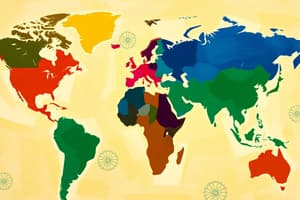Podcast
Questions and Answers
What are the two levels of actors in the international arena?
What are the two levels of actors in the international arena?
Domestic actors and States.
What are the three main components that define a State?
What are the three main components that define a State?
International law defines the type of government a State must have.
International law defines the type of government a State must have.
False (B)
What is required for a State to be recognized as such by international law?
What is required for a State to be recognized as such by international law?
Signup and view all the answers
In what year did the UN decide on the creation of two States in Palestine?
In what year did the UN decide on the creation of two States in Palestine?
Signup and view all the answers
What is a key principle of international relations regarding State interactions?
What is a key principle of international relations regarding State interactions?
Signup and view all the answers
Study Notes
Actors on the International Arena: States, International Organizations (IO)
- The planet is divided into States, delimited by borders, creating a two-stage arena, with the first level encompassing the domestic realm of each State, including individuals, local authorities, associations, companies, etc.
- The second level is the international community of States, often referred to as the "Concert of Nations".
- States are the primary actors of international relations (IR), historically the only actors until the emergence of International Organizations (IO) in the 19th century.
- IO are secondary actors in IR, created and managed by states, each with specific missions and logics defined by founding texts.
- Examples of IO include:
- The UN system (UN + specialized institutions linked to it)
- WTO
- Bretton Woods Institutions (IMF, WB)
- Security organizations (NATO)
- Regional organizations (EU)
- Technical organizations
- There are currently 193 states in the UN, a rise from 50 in 1945, largely attributed to decolonization and occasional secessions.
Defining a State: Components and Recognition
- A state is defined by three primary components:
- Territory: land, sky, and sea, delimited by borders.
- Population: national or multinational. States define rules governing nationality, citizenship, and access to their territory.
- Government: international law is indifferent to the nature of the government, which depends on history and domestic politics. It must, however, be an effective government, meaning it can control its borders and protect its population.
- Other existing states decide if a territory, population, and governing authority constitute a state in the sense of international law.
- Recognition leads to admission into a "society of equals."
- States are considered equal, regardless of their size and weight, with sovereign control over their internal order and domestic affairs.
- Non-interference in domestic affairs is a basic principle of IR, although "sovereignty" is often eroded in practice.
- Recognition of a new State can be achieved through unilateral statements, bilateral treaties, the opening of diplomatic relations, and admission to the UN.
Key Principles of International Relations
- Equal Sovereignty: States are equals, regardless of their size and weight, and are sovereigns, meaning they manage their internal order and domestic affairs freely.
- Non-interference: One of the basic principles of IR is non-interference in the domestic affairs of any State by another one. This does not reflect reality, as there is a wide diversity of states and "sovereignty" is often eroded.
- Reciprocity: States engage in diplomatic relations, including embassies and consulates, negotiations, treaties and agreements, and diplomatic and consular protection of their citizens.
Case Study: Palestine
- In 1947, UN General Assembly Resolution 181 divided the territory of the British Mandate in Palestine into two states: one for the Jews (Israel) and one for the Palestinian Arabs (Palestine).
- The two states would form an economic union, with Jerusalem being granted a special international status ("corpus separatum").
Challenges to International Order
- Many states face significant challenges in maintaining sovereignty and control over their territory, particularly due to internal conflicts, external interference, and globalized economic and political forces.
- The Palestinian case highlights the complexities of statehood and the challenges of international order in a world where the historical distribution of power and resources continues to shape political realities.
Studying That Suits You
Use AI to generate personalized quizzes and flashcards to suit your learning preferences.
Description
Explore the dynamics between states and international organizations in the realm of international relations. This quiz analyzes how these entities interact and the historical context of their emergence. Test your understanding of key concepts and examples like the UN, NATO, and WTO.




